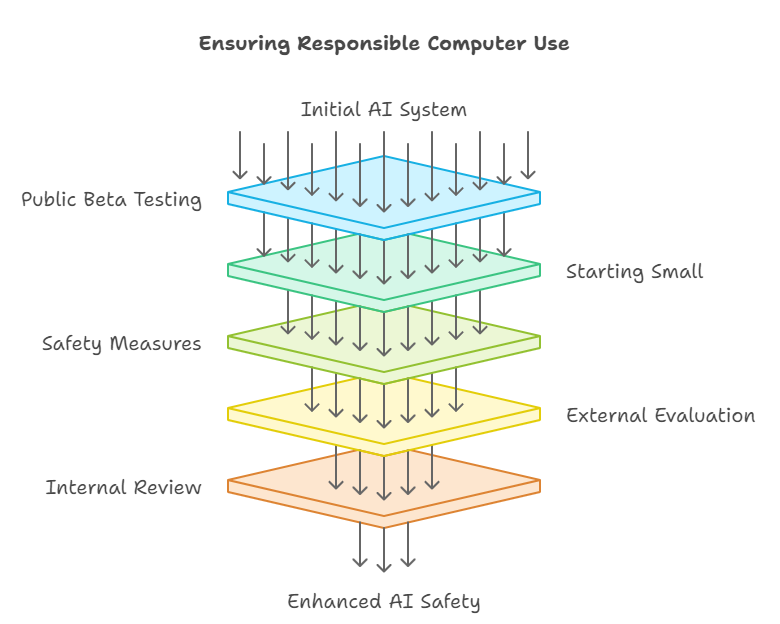When Anthropic added “computer use” to their newest model, Claude 3.5 Sonnet, it caused a big stir in the AI world. With this innovative feature, Claude can talk to computers in a way that looks and feels like talking to a person. Claude can now use digital interfaces, which means he is no longer limited to text-based exchanges. This opens up a huge range of options.
Simple Examples of Claude’s Computer Use Prowess
Imagine having a digital assistant that can seamlessly navigate the digital world on your behalf. Here are a couple of scenarios that illustrate the power of Claude’s new capability:
Scenario 1: Taming the Form-Filling Frenzy
There’s a boring online form that needs information that’s spread out across several websites and computer files. You don’t have to spend hours collecting and entering data by hand; you can just ask Claude to do it. Claude can then get to your files, open the right websites, find the information you need, and fill out the form spaces automatically.
Scenario 2: Streamlining Software Testing
As a programmer, you’ve just finished making a new app and need to make sure it works perfectly. You can tell Claude to open the app, look around at its functions, and do certain things. Claude becomes your tireless digital tester, finding bugs and problems with usefulness without you having to do each step yourself.
Real-World Applications: Claude is Already Making an Impact
Beyond these basic examples, companies are already harnessing Claude’s computer use prowess for more complex tasks:
- Replit: This online tool for writing code uses Claude’s skill to check out apps as they are being made in real time. This lets workers get immediate feedback on their work, which could speed up the development process.
- GitLab: Claude is used by this DevOps platform to power software development processes with multiple steps, especially DevSecOps jobs. The team at GitLab discovered that Claude can think better than earlier models, which makes it a useful tool in this field.
- Cognition: The company that does evaluations of AI has seen big changes in Claude’s ability to code, plan, and solve problems. This means that Claude’s use of computers improves its overall intelligence, letting it take on more difficult jobs.
- The Browser Company: This creative browser developer has found that Claude automates web-based processes better than any other model they’ve tried. This shows how Claude could change the way we use the internet by automating things that used to be done by hand and took a lot of time.
A Big Step Forward with Room to Grow
That Claude can use a computer is still very much in its early stages, but it is a big step forward for AI. Many fields could be changed by this technology because it can automate chores, make them more efficient, and create new opportunities. But it’s important to note that Claude’s computer skills aren’t perfect yet. Actions like scrolling, moving, and zooming can be difficult, and the fact that they could be abused to make spam or commit fraud needs to be dealt with.
Anthropic is working hard to make this technology better and more useful. They have put in place safety measures and are telling developers to begin with jobs that aren’t too dangerous. The company is also asking for feedback to help with future development and to make sure that the software is used responsibly.
Can you use this now?
Currently, Anthropic doesn’t provide specific step-by-step instructions on how anyone can use this new model. This is likely because the feature is currently in a limited public beta release, primarily accessible to developers through Anthropic’s API, Amazon Bedrock, and Google Cloud’s Vertex AI. If you a developer you can request for access the new model’s API.
How to ensure Responsible Computer Use?

As with any powerful technology, it’s crucial to address the potential risks associated with Claude’s computer use capability. Since this technology is still in its early stages, Anthropic is taking a proactive approach to ensure responsible deployment and mitigate potential harm.
Public Beta Testing: This allows developers to experiment and offer valuable feedback, helping Anthropic identify and fix any problems before a wider release.
Starting Small: Anthropic is encouraging the use of Claude’s computer skills for simple tasks first, as the AI is still learning how to handle more complex actions like scrolling and zooming.
Safety Measures: Anthropic has developed special tools (“classifiers”) that can detect if someone is using Claude’s computer access for harmful purposes like creating spam or spreading misinformation.
External Evaluation: By partnering with independent organizations like the US and UK AI Safety Institutes, Anthropic is getting a second opinion on the safety of this new technology before making it available to more people.
Internal Review: Anthropic is also conducting their own thorough review to make sure that Claude’s computer use capability meets their own high safety standards.
What’s Next for AI and Computers Use
When computers are used for the first time in Claude 3.5 Sonnet, it was a turning point in the history of AI. We are moving away from AI systems that only process and create text and toward systems that can connect with the digital world like people do. This creates a huge range of options that could be used in many fields and areas of our every day lives.
It is believed that this technology will become more and more a part of our digital lives as it develops and gets better. We expect AI systems to be able to handle our schedules, plan our travel, do research, and even write code, all without much help from a person.
Source: https://www.anthropic.com/news/3-5-models-and-computer-use


